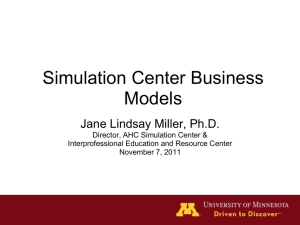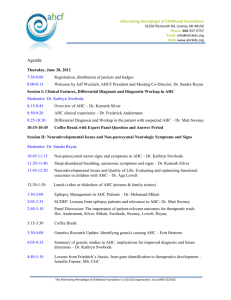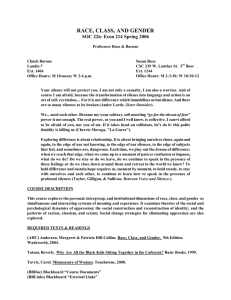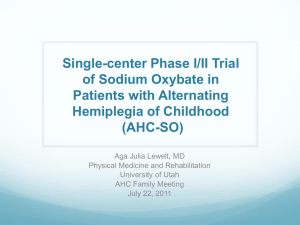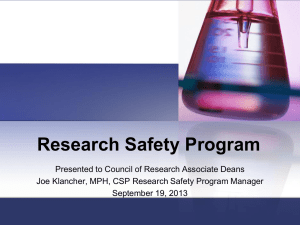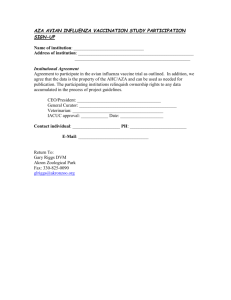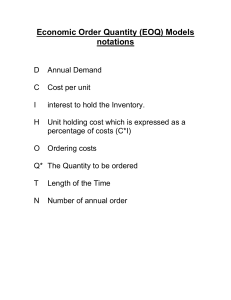AHCF meeting in Raleigh,NC. 22-24 July 2011
advertisement
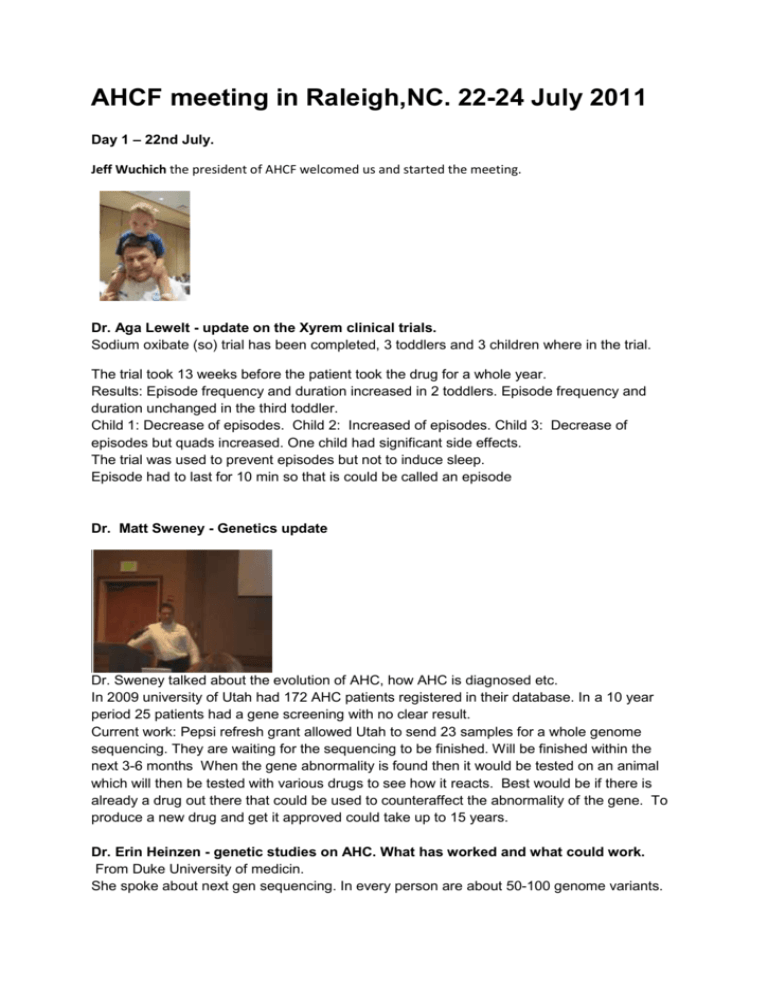
AHCF meeting in Raleigh,NC. 22-24 July 2011 Day 1 – 22nd July. Jeff Wuchich the president of AHCF welcomed us and started the meeting. Dr. Aga Lewelt - update on the Xyrem clinical trials. Sodium oxibate (so) trial has been completed, 3 toddlers and 3 children where in the trial. The trial took 13 weeks before the patient took the drug for a whole year. Results: Episode frequency and duration increased in 2 toddlers. Episode frequency and duration unchanged in the third toddler. Child 1: Decrease of episodes. Child 2: Increased of episodes. Child 3: Decrease of episodes but quads increased. One child had significant side effects. The trial was used to prevent episodes but not to induce sleep. Episode had to last for 10 min so that is could be called an episode Dr. Matt Sweney - Genetics update Dr. Sweney talked about the evolution of AHC, how AHC is diagnosed etc. In 2009 university of Utah had 172 AHC patients registered in their database. In a 10 year period 25 patients had a gene screening with no clear result. Current work: Pepsi refresh grant allowed Utah to send 23 samples for a whole genome sequencing. They are waiting for the sequencing to be finished. Will be finished within the next 3-6 months When the gene abnormality is found then it would be tested on an animal which will then be tested with various drugs to see how it reacts. Best would be if there is already a drug out there that could be used to counteraffect the abnormality of the gene. To produce a new drug and get it approved could take up to 15 years. Dr. Erin Heinzen - genetic studies on AHC. What has worked and what could work. From Duke University of medicin. She spoke about next gen sequencing. In every person are about 50-100 genome variants. They have sequenced 3 AHC patients with no apparent result. The physician panel addressed questions from the floor (Dr. Sandra Reyna,Dr. Ken Silver, Dr. Mohamad Mikati, Dr. Aga lewelt and Dr Matt Sweney) 1. How common is it for children to have episodes that are like drunkeness or almost unconscious state for hours? - not common 2. Is special nutrition important? - Yes and No - No real answer, depends on patient. 3. How many AHC cases in the world? - The answer was blurry but about 1/1.000.000? Which would be around 6852 – If this is the case it should be advertised so that we could have the attention of the drug companies to get funding to find the root of AHC and then manufacture a drug or find a drug that works/SJ 4. How much time to develop and get approval for an AHC drug? - 10-15 years. But when a cause is found then perhaps there is a drug out there that could be used? 5. How much is known about breathing difficulties in episodes? - Young women get more migraines at puberty and it an affect the breathing/ventilatory issues. 6. Parent was expressing is worries about the fact that is child was on strong epileptic drugs before it was diagnosed? Doctors not to be accused about that. First ahc symptoms are so similar to epilepsy. 7. Behavior issues, sudden outburst of crying and then laughing. Is there some reason for it? Brain damage can affect the feelings and lack of inhibition. Sometimes it is just an expression of frustration because they cannot express themselves but know better 8. Direction of the research from the doctors view? Why should we go in the direction of genetic studies instead of trying more drugs or a combinations of drugs? It's difficult to do studies with AHC, better to know the cause instead of trying new drugs. Have to have data to support drugs before trying new ones. Has to be well though out cautiously executed. Day 2 – 23rd July Dr. Ken Silver (University hospital of Chicago) – History of AHC including Flunarizine studies Dr. Silver was earlier working in Canada where AHC was originally discovered by Dr. Steel and Dr. Verret in 1971. Dr. Silver explained how difficult it is for doctors to define a rare disease. To define AHC doctors need to have a guideline and the Classical diagnostic criteria have been set into 6 criterias. Ken explained what the medical words really translate to for the regular person Hemiplegia: weakness on one side of the body Quadriplegia: Double hemiplegia Paroxysmal: A sudden outburst of emotion or action Tonic: Contraction of muscle Dystonia: Rigid muscles Oculomotor abnormalities: Abnormal eyeball movements Autonomic phenomena: Failure in autonomic system Bilateral: Two sides or both sides. Choreaoathetosis: Tingling sensation in limbs, tremors. Ataxia: Poor balance Nistacmus: Jerking eye movements, may last for minutes, hours or days. A common ocular dissorder in AHC. Hypotonia: floppy movements Dr. Silver took us through the paper published in Pediatrics 2009 http://pediatrics.aappublications.org/content/123/3/e534.full.pdf He also took us through the result of the paper published in Brain 2010. http://www.ahc.is/wp-content/uploads/2011/02/brainAhcEnrah2010.pdf He also explained how Flunarizine came to be the AHC drug of choice. The frequency did not decrease dramaticaly but the duration of episodes decreased. Side affects seem to be minimal. Bensodiapazines has also worked but not as well as Flunarizine Dr. Makati (Duke) Dr. Makati discussed the complex management of epilepsy and seizures issues related to AHC. He showed a video of an episode, dystonia episode and jerking seizures and how the EEG look like during these attacks. The EEG showed no change in AHC episodes or Dystonia attacks but showed clearly a change in the epilepsy jerks. 8 out of 44 AHC patients had epilepsy in a research done in the US. 9% but recent research showed 44/103 43% with epilepsy European and Japanese data shows an increase of seizures in the teenage years. Dominique Poncelin, president AFHA and Siggi Johannesson, president AHCAI, presented reports from the European associations. Siggi presented the social aspect of the European association and gave a short introduction of the Rare disease communities website http://www.rarediseasecommunities.org/en/community/alternating-hemiplegia Dominique presented the researches, finished, ongoing and future. Both Dominique and I felt that the meeting was impressed by what was ongoing in Europe and the feeling was that AHCF wanted to cooperate with us. It was clear that the Italian association is the most active one and are the leaders in Europe, we got a lot of positive feedback after our presentations which can be found here: http://www.ahc.is/en/publications/ - Lunch sponcored by AHCF - Joshua Magleby Phd. – Naurocognitive study Josh Magleby told us about a study of AHC patients: 41 participants almost 50/50 male/female Wide range of performance from poor to above average problem solving performance skills He told us to remember that our children are in fact children like all children and some behavior " problems" are not confined to AHC. All children have a problem with trying to control their behavior. Look at the behavior in context of what you are doing and why the child is behaving like it is. "All behavior serves a function" When you take your child to the store and your child starts to " act up" stop and think why is the child acting up ? Perhaps it is because they are afraid of crowd or they want something that they cannot have. What can you do? One is not to take the child to the store. Another is to explain to the child more what you are going to do.. Try to decrease the anxiety. Also you could give the child something they like i.e. food to lessen the anxiety and take their mind of the thing that is making them feel bad. Maglebyphd@gmail.com End of day 2 AHCF invited Dominique, Siggi and Ragga to dinner where we discussed future collaboration of Europe and USA Dominique, Jeff and Siggi Day 3 July 24th Dr Makati – New insights into AHC – Resent European and Japanese study Dr. Mikati Study of 4 patients in Japan investigated weather japanese patients with AHC have the same small vessel abnormalities that was reported in a European study. Substance P was checked – increased MMP-9 and decreased substance P European registry reported that Hypotonia(floppy movements) got less with age. (Unfortunantely I had to leave this presentation so I did not copy more of it /SJ) Parent forum Day 3 ended with a parent forum where experenced AHC parents, Karen Venti, Nandana Perera, Mary Kay Riley, Mark Eagan, Carol Prunty and Bill Gerber led a discussion of everyday issues related to raising and living with an AHC child. Points that were raised at the forum: - AHC kids will not be able to do math! – I would like to know if you know anyone who can?/SJ Home schooling is an obtion that parents should consider – teaching in the form of a game has proved to work well. To live with AHC you have to illiminate the triggers from the enviroment that the child lives in. Many more points were raised but not recorded by me AHCF is intending to organise a joint families/scientists meeting for the end of June 2012 in San Francisco. About 35 families attended the meeting. At any time about 50-60 persons were participating in the meeting and the parents were very active and asking many questions. All the presentations and a video of the meeting will be available on the AHCF website http://ahckids.org/ END OF MEETING Note Before the meeting started the children had appointments with the doctors where their medical history was updated and blood drawn from those that had not done that before. The meeting was very well executed, The hotel accommodation were perfect for this meeting. The meeting rooms where large, the playroom for the children was next to the meeting room there were lots and lots of activities for the children. The atmosphere at the meeting was relaxed and parents were not afraid to ask questions. Outside the meeting the children and parents bonded quickly and there was a real family feeling where people did not have to explain the condition of their child, everyone was on the same boat heading for the same goal. It seems that we keep on bumping into closed doors and that the research and trials that are being done are not getting us closer to our goal to find a cure for our children. One of the conclusions of this meeting was that it is imperative to do a complete genome sequencing http://en.wikipedia.org/wiki/Full_genome_sequencing for at least 3 patients to find the source of the problem. AHCF is determent to do the full genome sequencing and so are the Italian and French Association. An idea formed at the meeting to combine our resources and do the sequencing together and share the outcome. That way the financial side could be shared by all the associations. The AHCF and the French association are positive in considering that option. I have talked to Kristleifur Kristjansson http://www.decodeme.com/editorial-team Director of Medical Affairs at deCODE Genetics http://www.decode.com/ about doing the gene sequencing. I asked him if DeCode was able to do the sequencing, the answer was yes. How much it costs, how long it will take and if they are willing and have the time to do it he does not know at this moment. He will report back to me within 2 weeks. My thought was that since DeCode is an Icelandic company the cost might be less since the Icelandic Krona has taken a steep fall against the USD and the Euro these last 2 years. Dr. Swoboda has used DeCode in the past to do some research. Siggi Johannesson AHCAI
